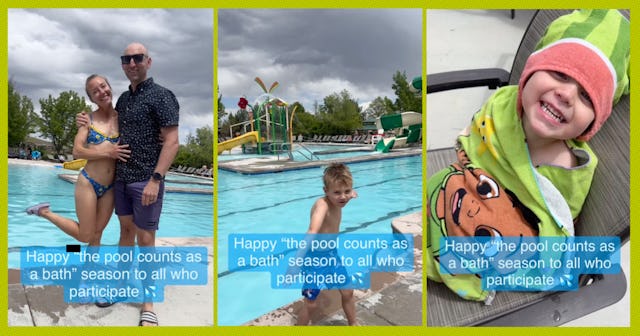A Mom Sparked Debate After Joking That Swimming In The Pool Counts As A Bath
The comments on her viral video went wild.

After a long day at the swimming pool, are you taking the kids home to bathe or shower? Or do you think that the chlorinated water counts as a bath?
One mom sparked a major debate on Instagram after sharing a viral video, joking that baths are no longer necessary because summer is in full swing. Her family just uses the pool as a bathtub!
“Happy ‘the pool counts as a bath’ season to all who participate,” Neely Gracey wrote in text overlay on a video of her family at the swimming pool.
“Plz tell me I’m not the only mom who is celebrating 🥳,” she wrote in the caption on the now-viral video.
After her video gained traction, thousands of Instagram users commented on the video. Some agreed with the OP’s take while others were horrified that she would even joke about such a thing.
One user wrote, “Noooo wayyy man. Pool day means it is DEFINITELY a tubby 🛀 night for my kiddos. So gross, chemicals, sunscreen, sweat, pee, salt, etc 🤢😬”
Another echoed, “I never want to shower harder than after a long day at the pool or the beach 😂”
One lifeguard weighed in and noted, “Sorry I’m a lifeguard and the chlorine does not clean our skin well!! It actually disinfects the water from piss and poo but it leaves our skin nasty and dry and gross with all the chemicals and bacteria on us”
“As a swimming instructor, wash your body and hair after swimming. It damages your skin and hair cells worse than anything. So dry and itchy!” another wrote.
After seeing this video, I spoke to a couple of my mom friends who agreed with the OP’s point of view (whether she was joking or not). My friend has three kids all on their neighborhood swim team.
She takes the kids to the pool every night for a family swim, and they don’t get home until around 7 p.m. The kids are up the very next morning for swim practice at 6 a.m. She doesn’t see the point in bathing them when they’re just going to get in the water 12 hours later.
Okay, that gives a little more context for why parents might skip a bath after the pool, but what does science have to say about all this?
While pools are chlorinated to kill germs, substances like urine, sweat, makeup and lotion that are brought into pools by swimmers can react with chlorine and reduce its ability to kill viruses and bacteria, according to the Water Quality and Health Council.
Most public pools instruct patrons to rise before swimming to reduce the risk of contamination.
In gross news, a 2019 survey by the same council found 51% of Americans use the pool as a “communal bath” where they rinse off after exercising, doing yardwork and as a substitute for taking a shower.
Just to be clear, in a shower or bath, you’re typically using soap to scrub your skin and get it clean. When you swim in a pool, you’re essentially floating in a giant bath with other people and zero soap.
There is no reason to think that Chroline is doing anything to clean yourself or your kids. In fact, in 2019, the Centers for Disease Control and Prevention (CDC) issued a warning about the growing presence of the fecal parasite Cryptosporidiosis in public pools.
Cryptosporidiosis is a chlorine-resistant bug which can cause diarrhea, nausea and cramping. These pathogens are sometimes transmitted in water via the presence of fecal matter, saliva or vomit.
And while it’s unlikely your kid will get sick from the pool, there’s still a chance.
“Outbreaks have almost always been when the chlorine levels are too low,” Dr. Amy Baxter, a pediatric emergency physician in Atlanta told Care.com. “For a well-maintained community pool, risks are extremely low.”
“Parents don’t know if a child could have a small cut or injury to the skin that could be a point of entry for infection while swimming,” she continued. “You are exposed to potential infections from others who share the water with you even if that water is monitored and treated routinely.”
Long story short, if you can wash your kid after the pool, do it!